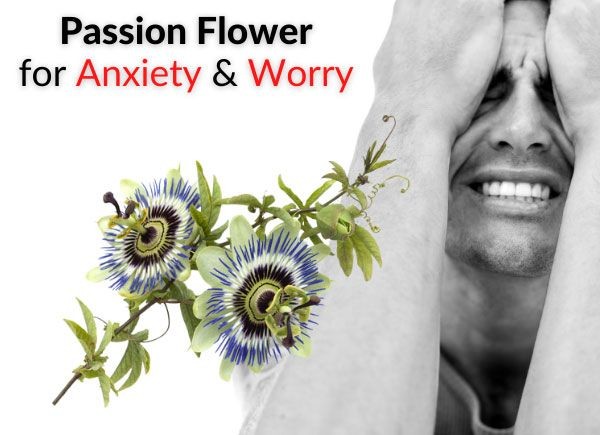
Contents
Passion Flower
Brand and Other Names: apricot vine, corona de cristo, Fleischfarbige, fleur de la passion, flor de passion, maypop, passiflora incarnata, passion vine, purple passion flower, water lemon, wild passion flower
Drug Class: Herbals
About Passion Flower
Passion flower, also known as Passiflora incarnata, is a vine with white and blue or purple flowers. It is native to the Americas and widely grown in Europe. Traditionally, passion flower leaves, stem, and flowers have been used as herbal medicine to treat anxiety, insomnia, hysteria, epilepsy, and mild pain. Flavonoids like apigenin are believed to contribute to its medicinal benefits. Animal studies suggest that passion flower has sedative, anxiety-relieving, analgesic, and antispasmodic effects by enhancing the levels and activity of gamma-aminobutyric acid (GABA), the primary inhibitory neurotransmitter in the brain. However, scientific studies on its safety and efficacy are limited. In the past, passion flower was approved as an over-the-counter sedative and sleep aid, but its approval was withdrawn in 1978 due to a lack of evidence supporting its safety and effectiveness.
Passion flower is available in various forms including dried extracts, liquid extracts, tinctures, teas, creams, lotions, soaps, and cosmetics. It is also used as a flavoring agent in foods and beverages. Some suggested uses of passion flower include generalized anxiety disorder, anxiety before surgery, adjustment disorder, attention deficit hyperactivity disorder (ADHD), insomnia, opiate drug withdrawal symptoms, cardiac rhythm abnormalities, muscle cramps, fibromyalgia, nerve pain (neuralgia), seizures, gastrointestinal complaints, menstrual cramps, premenstrual and menopausal symptoms, and topical use for hemorrhoids, burns, and swelling.
Warnings
Avoid taking passion flower concurrently with other sedative medications.
Side Effects
Common side effects of passion flower may include confusion, altered consciousness, impaired coordination and balance, dizziness, drowsiness, liver toxicity, blood vessel inflammation, nausea, vomiting, pancreas toxicity, heart rhythm disturbance, and rapid ventricular contractions.
Contact your doctor immediately if you experience any of the following symptoms or serious side effects while using this drug:
- Serious heart symptoms such as fast or pounding heartbeats, fluttering in your chest, shortness of breath, and sudden dizziness;
- Severe headache, confusion, slurred speech, severe weakness, vomiting, loss of coordination, and feeling unsteady;
- Severe nervous system reaction with very stiff muscles, high fever, sweating, confusion, fast or uneven heartbeats, tremors, and feeling like you might pass out; or
- Serious eye symptoms such as blurred vision, tunnel vision, eye pain or swelling, or seeing halos around lights.
This is not a complete list of all side effects or adverse reactions. Contact your doctor for medical advice about serious side effects or adverse reactions. You may also report side effects or health problems to the FDA at 1-800-FDA-1088.
Dosages of Passion Flower
There is insufficient reliable information to determine an appropriate dose of passion flower.
General dosing guidelines:
Dried: 0.25-2 g orally three times daily
Tea: 1 cup orally two to three times daily and 30 min before bedtime; 0.25-2 g/150 ml water
Liquid Extract: 0.5-1 ml orally three times daily; 1:1 in 25% alcohol
Tincture: 0.5-2 ml orally three times daily; 1:8 in 45% alcohol
Liquid Extract: 45 drops orally daily
Opiate Withdrawal: 60 drops orally daily
Overdose
Passion flower overdose may cause confusion, drowsiness, and loss of coordination in some people. There have been reports of nausea, vomiting, drowsiness, cardiac rhythm disturbance, and rapid ventricular contractions (ventricular tachycardia) in individuals taking therapeutic doses of passion flower. Overdosage may be managed with supportive and symptomatic therapy.
Drug Interactions
Inform your doctor of all medications you are currently taking to determine any possible drug interactions. Passion flower has no known severe or serious interactions with other drugs, but it has moderate interactions with at least 27 different drugs. Mild interactions have not been reported.
Please consult the RxList Drug Interaction Checker for more information on drug interactions.
Always inform your doctor, pharmacist, or healthcare provider about all prescription and over-the-counter medications you use, including dosage, and keep a list of this information.
Pregnancy and Breastfeeding
Avoid using passion flower if you are pregnant as it may induce uterine contractions. There is insufficient information on the safety of passion flower during breastfeeding.
Additional Information
Passion flower is generally safe when used in small amounts. Follow label instructions when taking passion flower supplements. Keep these supplements out of reach of children. Exercise caution when choosing passion flower products as they are not stringently regulated by the FDA, and there may be discrepancies between labeling and ingredients. Always consult your healthcare provider before taking any supplement.
Summary
Passion flower is an edible fruit that has been traditionally used as herbal medicine for treating anxiety, insomnia hysteria, epilepsy, and mild pain. It is important to avoid taking passion flower with other sedative medications. Common side effects include confusion, altered consciousness, impaired coordination, dizziness, drowsiness, liver toxicity, blood vessel inflammation, nausea, vomiting, pancreas toxicity, heart rhythm disturbance, and rapid ventricular contractions.


